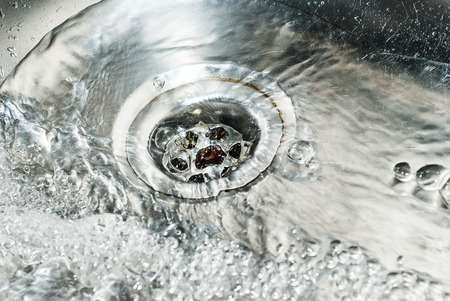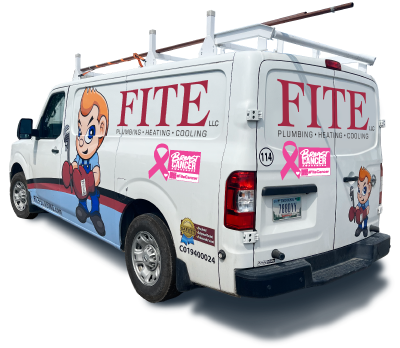What is a drain – in the typical plumbing kind of thinking?
As a noun, Webster’s defines a drain as
“a pipe or channel, carrying water away or sewage from a house, street or building”
Typical drains in our homes and buildings
During our typical busy days, we don’t think too much about plumbing, let alone one aspect of plumbing like drains. Most of us just want it to work right and when it doesn’t we get annoyed and, a lot of time, angry. As professional plumbers, all of us at Fite Plumbing know our customers aren’t mad at us, but upset about the situation.
We don’t like it when you have a plumbing emergency. Even though we are ready to help when you need us, we also want to help you prevent as many of those emergencies as possible – at home or in your business.
Today, let’s focus on keeping drains running smooth for you!
Kitchen sinks
Run hot water through a sink after each use.
Throw a handful of baking soda down the drain and rinse with hot water. (Helps eliminate odors, too!)
Pour a cup of vinegar into drain and let it sit for about 30 minutes. Rinse with hot water.
Never pour grease down a drain. The grease is only in a liquid state when it is hot. As it cools it solidifies and creates a clog. This include meat drippings from roasters, too. Let the grease or grease and fat solution cool then discard it in the garbage.
For sinks with disposals:
Scrape food into garbage instead of stuffing the disposal.
Let the disposal run for about an extra 45 seconds to prevent missed food from collecting.
Clean the disposal with baking soda and/or citrus peels on a regular basis.
Bathroom sinks
Do not rinse hair down the drain. Brush hair away from the sink.
Use pump soaps for handwashing. Prevent bars from being washed into the drain.
For all sinks – and the rest of your plumbing, too
Sinks are often used to “get rid of” other things, too. For instance, paint, glue, glitter, and all sorts of craft materials are often washed off in sinks and go down the drain. Consider what happens when any of those materials dry out – do they harden? If so, remember that the same will happen in YOUR DRAIN and in the rest of your plumbing pipes.
Pay attention to what you are rinsing off your hands, clothes and tools.
Sometimes clogs begin from the collection of hard water minerals such as magnesium and calcium. If your water is hard, which is often evident from the crusty white buildup you will see on faucets, shower heads, and sprayers, you probably should consider a water softener. A water softener does more than make more bubbles and help you feel cleaner, it prevents scale from effecting your pipes, fittings, and fixtures. Fite Plumbing has a reputation for fast and easy water softener availability and installation. Call us at 317-271-5400 to learn more.
Toilets
In addition to clogs that begin with mineral buildups in toilets, the most common problem with them is that excess toilet paper or things that have been flushed that should NOT have been flushed creates a clog. Accidents occasionally occur, and children need to learn lessons, but being proactive with toilet maintenance is still important. If there is a funny flush or the handle needs to be jiggled, take care of the problem before you have a waterfall. We understand it’s one more thing you have to do. Call us here at Fite. We can take care of it no problem – we’re good at it!
There is one more drain to consider
When we think of drains, we immediately think about sinks – and maybe a few people through in a tub, shower, or toilet. It’s not often that our minds conjure up images of floor drains. Maybe that’s because we think of home plumbing, not the plumbing in our offices and businesses.
But we should!
Clogged floor drains, back-ups, or unpleasant odors might be more than a nuisance. Backed up water can be costly:
- Spoiled or damaged inventory because we know that places where floor drains are located are also used as storage areas!
- Damage to other pipes in the plumbing system because the added pressure or change of pressure can stress fittings thereby shortening their life spans.
- Loss of customers or patrons because of odors or mess, especially if they see backed-up water in other areas such as kitchens and dining rooms.
- Insect infestations are created because drains feed into sewer systems and the eco-system is prime for breeding grounds.
- Replacement and repair costs.
So, before you find yourself with the mess and cost of a floor drain issue, we want to give you a few tips to prevent a problem.
- Make sure floor drains have screen covers. This prevent larger debris from falling into the drain and creating clogs.
- Do not cover floor drains. Make sure that there are no rugs, boxes, fixture or appliances on top of drains. This is for two reasons. First, you want the drain to do its job and drain away water and anything on top of the drain restricts flow. Second, you need access to the drain for maintenance and repairs, if needed.
- Do not sweep dust and floor dirt into floor drains. Train workers accordingly because the more debris that collects in a drain, the greater the potential that there will be a clog in the future.
- Routinely flush the drain with hot water. Again, two reasons. The first is to keep it clean and, if there is a trap, you want it to retain a small water level to seal the sewer gases. Second, you want to make sure the water flows. If you find the water does not drain, or drains slowly, it’s time to prevent a major failure with some investigation and maintenance.
- Consider a preventative maintenance plan. A regular check from a professional like Fite Plumbing can make sure you protect your assets and business from disruption and loss.
We don’t want you to cringe when you do happen to think about your plumbing. At Fite Plumbing, we want you to feel you have it all under control. And you do – because in that fight, you have Fite Plumbing in your corner!


